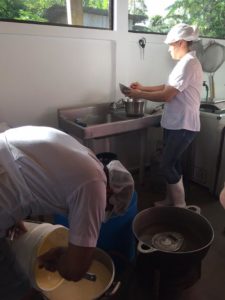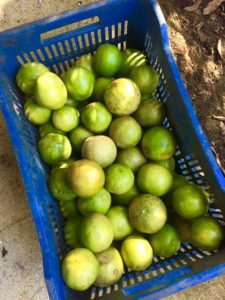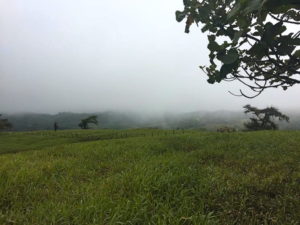“One’s identity is in large part a function of one’s membership and role in a group…The survival and success of the group ensures the well-being of the individuals, so that by considering the needs and feelings of others, one protects oneself. Harmony and interdependence of group members are stressed and valued,” said Craig Storti, former Peace Corps Volunteer and trainer.
A primary group’s inclination to sacrifice its goals and values for the greater good of the group, or society, can characterize Storti’s idea of collectivism. The group or society is the primary unit of moral concern to which the individual adds value. The practice of collectivism gives priority to the greater good of a group over individuals within it – a practice that I have seen demonstrated in Costa Rican society.
After a week in the northern rain forest regions of Costa Rica, I observed a sense of collectivism for family and community through a number of characterizing points. At each farm we visited, the family members were always willing to lend a helping hand if needed, sometimes without even being asked.

Costa Rican dairy farmer, Chrisley, and his wife, Patricia, collaborate to produce fresh cheese from their dairy cows.
Chrisley, the owner of the dairy farm we visited, gave us an insightful tour of his property. His youngest daughter joined along, walking hand-in-hand with her father. During the tour, we also had the opportunity to meet Chrisley’s wife, who he only referred to as “amor” (“my love” in Spanish). Children and dogs were running around on the land, excited by the 32 visitors to their home. It was evident that family was everything to this successful, humble farmer.
“The philosophy of the family is to produce enough for the family to eat and if we produce more, then we sell it,” Chrisley said.
Each family built their lives around the fertile land that they lived on; cherishing it for the nourishment and capital it provided for their families and communities. In this sense, the term “collectivism” not only applies to an entire community of people, but it can also apply to a single family who collaborates to serve the greater good of their loved ones.
Francisco Morazon Fernandez, a Soltis Center biologist, said there is a higher value placed on community in the more isolated areas of Costa Rica – something that is “lost in urban zones.” As opposed to the booming metropolitan cities, such as San Jose, Fernandez’s home city, collectivism is demonstrated in rural areas through protection and awareness of friends and family.
However, collectivism varies in Costa Rica, depending on geographic regions and cultures. For example, the eastern border facing the Caribbean Sea may differ from the western border with the Pacific Ocean, according to Fernandez.
The United States Department of Agriculture (USDA) began the People’s Garden Initiative to establish organic gardens worldwide, breaking ground in San Jose, Costa Rica’s capitol city, in Fall 2009. This initiative will help to extend the collectivism-based ideals to more urban areas of Costa Rica. The main goal of this garden is to help strengthen the community and environment, contributing to the greater good of Costa Rican society.
“With our People’s Garden, we not only come together as a community to grow healthy foods, we also grow respect for the earth and for those who farm,” said Anne Slaughter Andrew, the U.S. Ambassador to Costa Rica.
The positive purpose of this program reaffirms the information that I have gathered while speaking and listening to the locals in San Isidro de Peñas Blancas.
On a national scale, Costa Rica demonstrates collectivism, concerning humans, animals, plants and the environment, by practicing significant conservation and preservation methods that ultimately serve the greater good of society. For example, Nectandra is an organization that promotes the conservation and restoration of the cloud forest ecosystems of Costa Rica through public education, scientific research and watershed stewardship. This organization, founded in 1999, initiates education, scientific research and community outreach, while encouraging others to take the conservation-based knowledge learned at the facility out into the rest of the world.
I feel very lucky to have had the opportunity to visit the cloud forest during my time in Costa Rica, because of its immense beauty and rarity of existence. Arturo Jarquin, Nectandra Cloud Forest Preserve Manager, described the cloud forest as the “stairway to heaven.”
As I reflected on my visit to the cloud forest, I immediately linked Nectandra, and other similar organizations, to the concept of collectivism, because of their work to improve the world using natural methods, even if the effect is small. Their efforts are purposefully for the greater good of society and the world.
I feel fortunate for learning about the importance of conservation and utilizing natural means to benefit society. As a journalism major, I was intrigued by the biodiversity of Costa Rica and look forward to delving deeper into conservation methods through research. Through my reporting, I hope to stress the importance of conservation of rare ecosystems.
I can apply this learned sense of collectivism to my personal life, as a student at Texas A&M University, by making small decisions that will contribute to preservation efforts that will benefit the greater good of society, if only in a small way.

